Kishi Nobuyuki was born in Shinjo, a rural city in Yamagata Prefecture, which is part of Tohoku, northeastern Japan. Traditionally, Shinjo people have oriented themselves to Mount Gassan (月山), the highest of the three mountains of the Dewa Sanzan. Prevailing winds blow across the Sea of Japan from Siberia, bringing abundant moisture; as a result, Gassan receives an annual deposit of about 30 meters of snow that melts in the spring, providing fresh water for the rice fields and sake brewers.
Kishi Sensei grew up in the harsh post-war economy, helping his father with subsistence farming, charcoal making, and construction projects. His upbringing in an environment marked by distinct seasons made him acutely aware of the blessings and dangers of nature.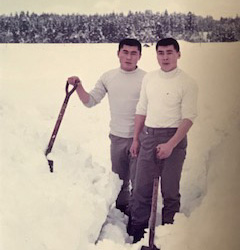 Young Kishi Nobuyuki (right) with his brother Yasunori (left) in Tobita.
At the age of 19, Kishi Nobuyuki made the very deliberate decision to defy his father’s will, and he secretly left home for Tokyo to train among the best in karate. He became a dedicated uchideshi (live-in student) of Masutatsu Oyama, the founder of Kyokushin Karate. He was sent to Taiwan, New York, Italy and Romania to help spread the style of full-contact Kyokushin Karate.
Young Kishi Nobuyuki (right) with his brother Yasunori (left) in Tobita.
At the age of 19, Kishi Nobuyuki made the very deliberate decision to defy his father’s will, and he secretly left home for Tokyo to train among the best in karate. He became a dedicated uchideshi (live-in student) of Masutatsu Oyama, the founder of Kyokushin Karate. He was sent to Taiwan, New York, Italy and Romania to help spread the style of full-contact Kyokushin Karate.
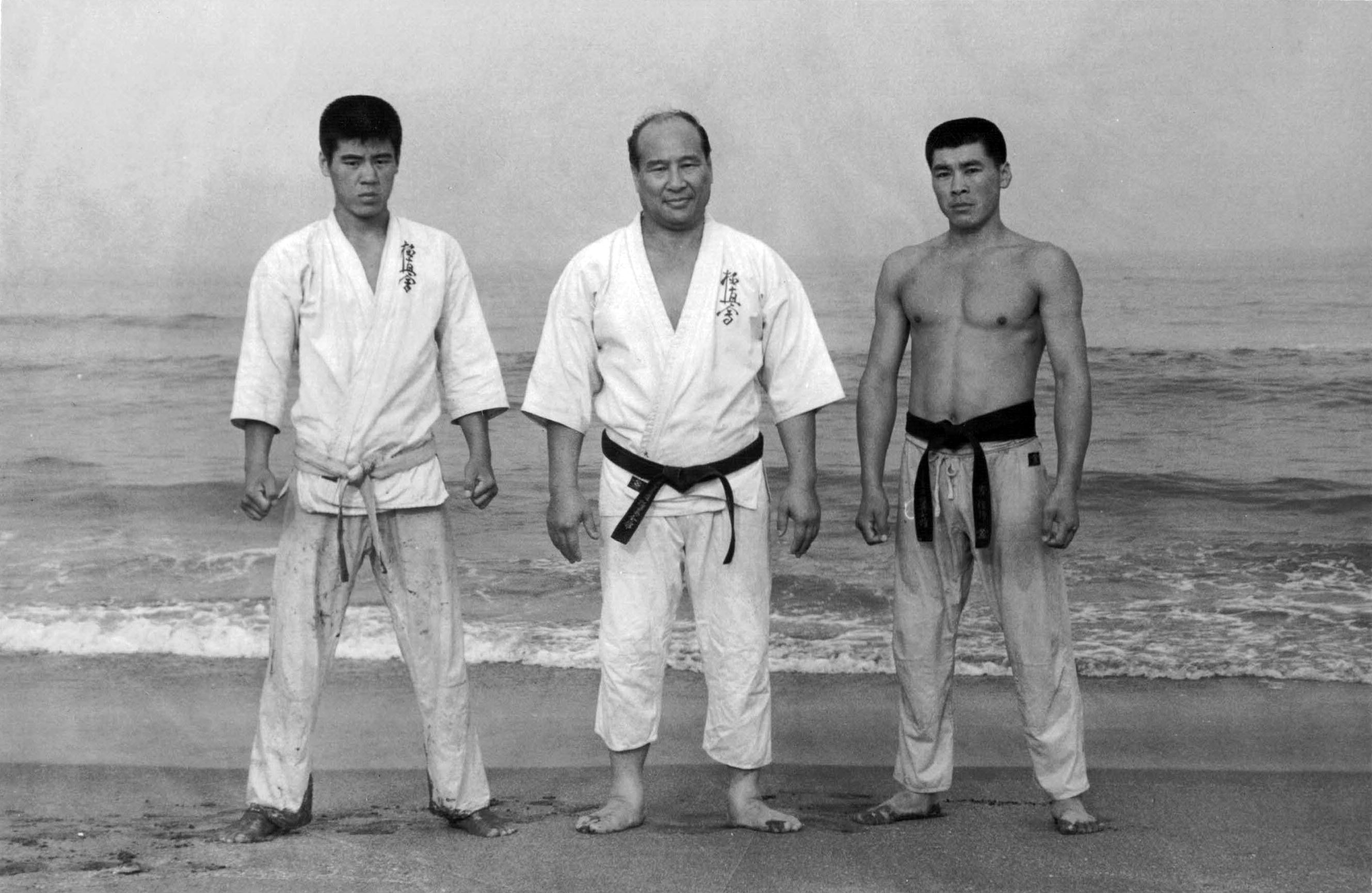 Kishi Nobuyuki (right) shortly after receiving his shodan from Masutatsu Oyama (center).
Although it is now recognized as a competitive sport, Kishi Sensei understood karate differently. As much as karate is about training the body, it is also about training one's mind and heart. He sought to help each student use their karate training to align with their inner motivations and their unique body and psychology in order to find balance and truth in themselves. He believed that each of us can be more than we are today, and can do better than we did yesterday; the opponent is ourselves.
Kishi Nobuyuki (right) shortly after receiving his shodan from Masutatsu Oyama (center).
Although it is now recognized as a competitive sport, Kishi Sensei understood karate differently. As much as karate is about training the body, it is also about training one's mind and heart. He sought to help each student use their karate training to align with their inner motivations and their unique body and psychology in order to find balance and truth in themselves. He believed that each of us can be more than we are today, and can do better than we did yesterday; the opponent is ourselves.
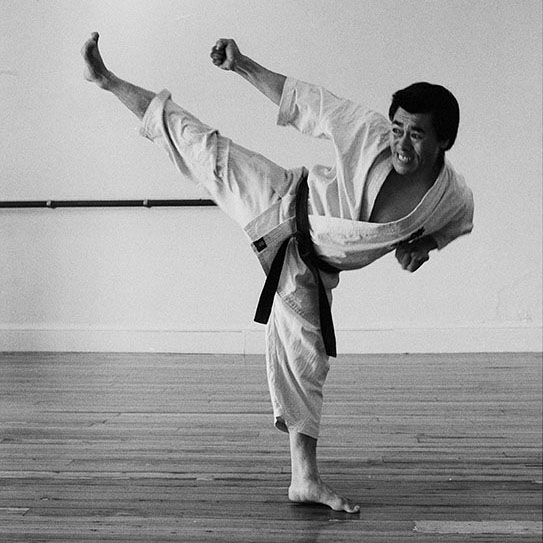 Kishi Sensei's simple beauty and balance in technique maximized power while economizing movement.
Through sweating and pushing one's physical limits, we learn to understand our capabilities and mental resources, thereby gaining a confidence that transfers to other areas of life. By giving oneself the opportunity to engage in kumite, we develop respect for ourselves and others, and become more peaceful and courageous. In each training session, there are expected routines, unexpected challenges, kata, kumite with various sparring partners, and seated meditation with eyes closed as breathing settles into a calm rhythm. Karate practice is an active meditation that encourages a healthy mind and a healthy body. It is a way of life.
This was a philosophy that did not fit with membership in a large organization, and Kishi Sensei left Kyokushin to open his own independent dojo in New York City under the name of Kishi Karate.
Kishi Sensei's simple beauty and balance in technique maximized power while economizing movement.
Through sweating and pushing one's physical limits, we learn to understand our capabilities and mental resources, thereby gaining a confidence that transfers to other areas of life. By giving oneself the opportunity to engage in kumite, we develop respect for ourselves and others, and become more peaceful and courageous. In each training session, there are expected routines, unexpected challenges, kata, kumite with various sparring partners, and seated meditation with eyes closed as breathing settles into a calm rhythm. Karate practice is an active meditation that encourages a healthy mind and a healthy body. It is a way of life.
This was a philosophy that did not fit with membership in a large organization, and Kishi Sensei left Kyokushin to open his own independent dojo in New York City under the name of Kishi Karate.
In his karate practice, Kishi Sensei strove for a simple beauty and balance that maximized power while economizing movement. The phrase kobushi-hitosuji – meaning “fist” and “to devote your life to one thing” – represented the reality of Kishi Sensei's life.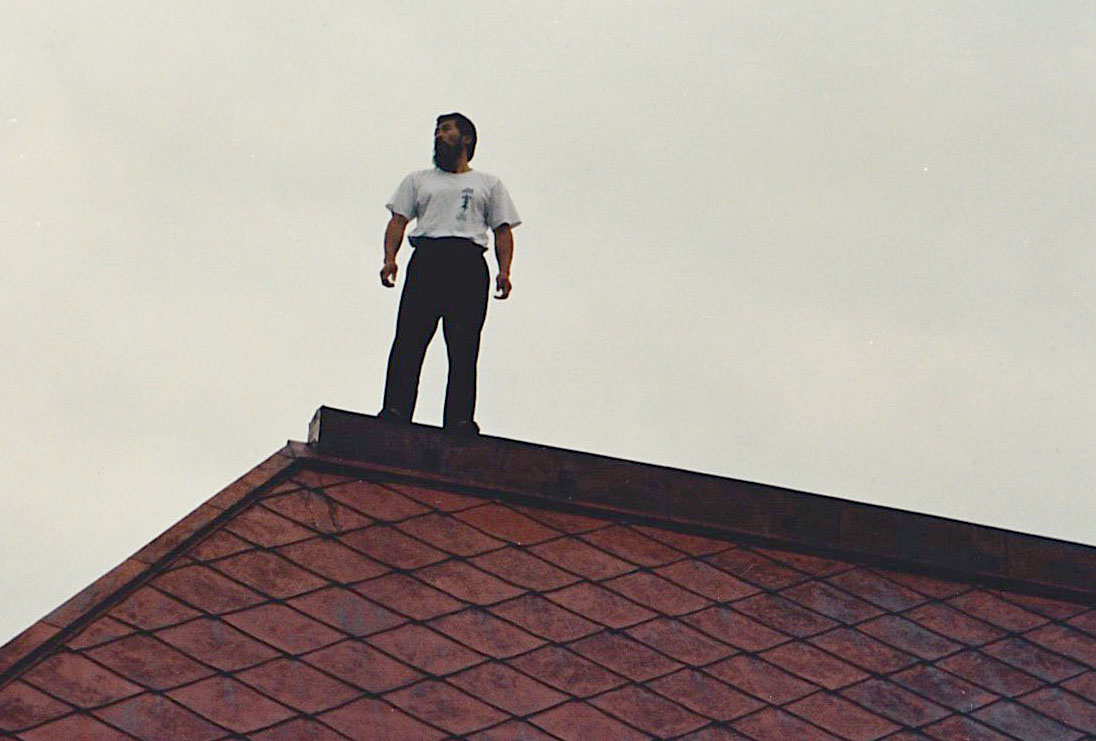 Standing on the roof of his Shinjo dojo, a former Meiji period samurai house.
Standing on the roof of his Shinjo dojo, a former Meiji period samurai house.
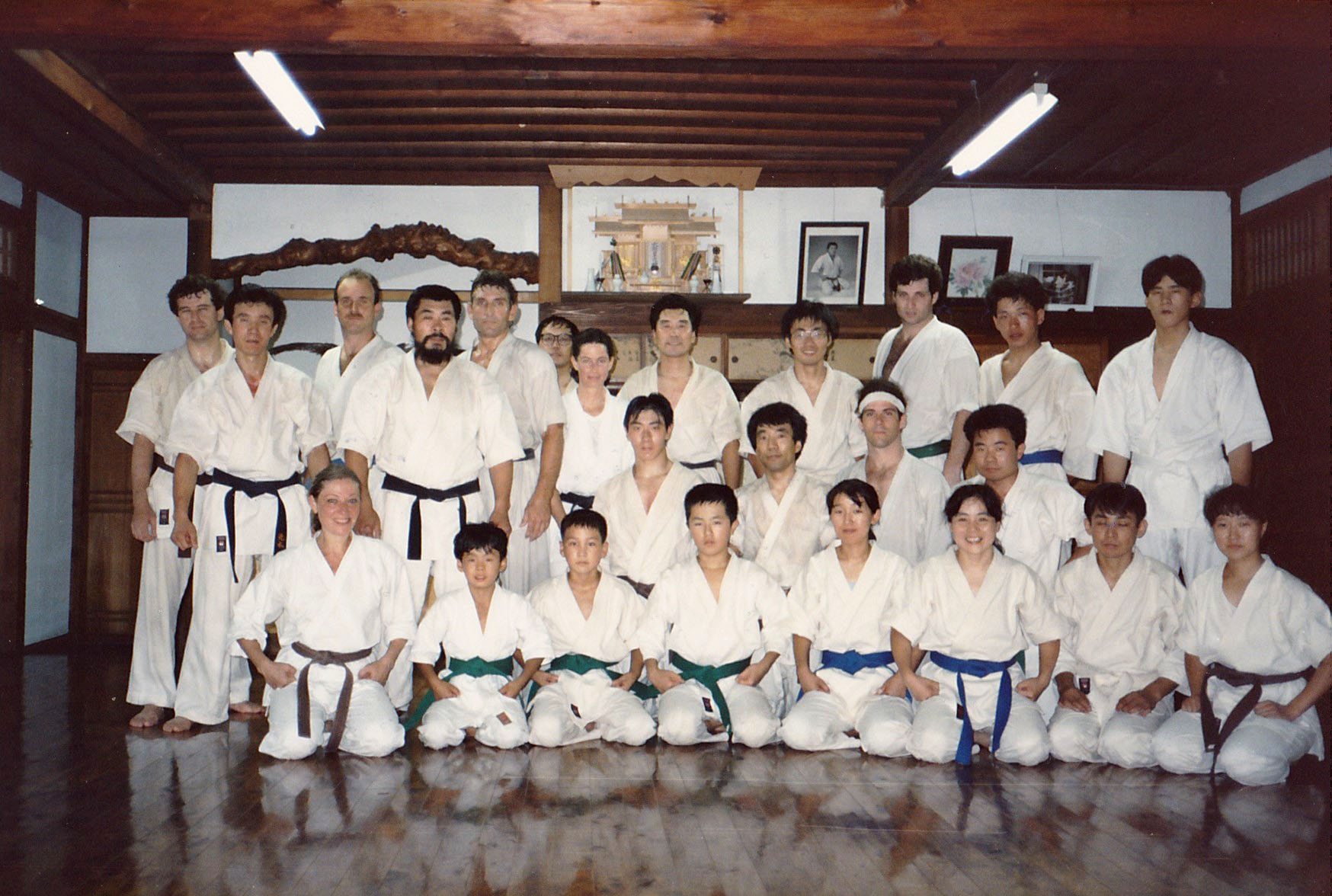 In his Shinjo dojo after training with his local Japanese students and visiting New York students.
In 1994, he left his dojo in New York and returned to Japan to care for his mother. After her death, he remained in Shinjo and continued to teach and train at his own Kishi Karate dojo there. When Kishi Sensei first opened his Shinjo dojo, there was no sign over the entrance. “What about a sign?” he was asked. Kishi Sensei answered, “If people really want to find me, I’m sure they will.” This proved true, and people from all over did come to visit and train with him.
"I believe that Karate already exists inside everyone’s body. You must develop and polish what’s inside you to make your own Karate. Even if there is no dojo nearby, training on your own can take you very far if you have a passion for it."
In his Shinjo dojo after training with his local Japanese students and visiting New York students.
In 1994, he left his dojo in New York and returned to Japan to care for his mother. After her death, he remained in Shinjo and continued to teach and train at his own Kishi Karate dojo there. When Kishi Sensei first opened his Shinjo dojo, there was no sign over the entrance. “What about a sign?” he was asked. Kishi Sensei answered, “If people really want to find me, I’m sure they will.” This proved true, and people from all over did come to visit and train with him.
"I believe that Karate already exists inside everyone’s body. You must develop and polish what’s inside you to make your own Karate. Even if there is no dojo nearby, training on your own can take you very far if you have a passion for it."
Kishi Sensei’s love of walking in the mountains, clean air, and peaceful harmony with nature ran very deep. He dreamed of establishing a mountain dojo where people could put aside daily preoccupations and concentrate on finding their natural energy and strength. He believed that being alone in nature provided the best opportunity to develop the courage to confront our lives honestly and directly.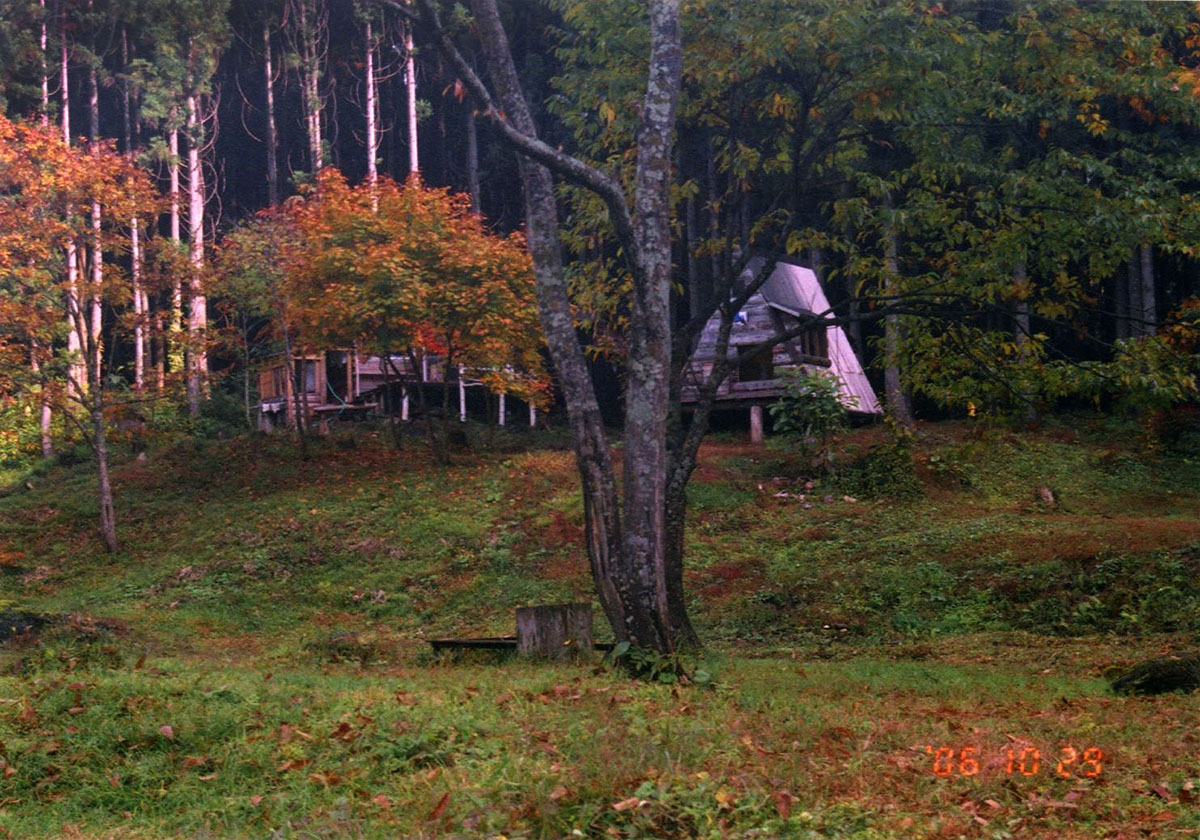 The first two cabins at Kishi Sensei's mountain dojo.
“When a person has a poor character, his karate is also poor — that is what I believe. It does not matter how athletic you are or how many trophies you’ve won. Simply said, it is your sincerity of heart that determines your karate. Also, if you are not in earnest, you cannot be a karateka. Technical skill and power are earned by diligent training. The word Bujutsu — meaning martial arts — consists of two characters, 'bu' and 'jutsu' meaning fighting skill. The word 'Budo' includes the sense of seeking the path or 'way' of a warrior. You must truly seek the way of karate in order to become a real karateka.”
The first two cabins at Kishi Sensei's mountain dojo.
“When a person has a poor character, his karate is also poor — that is what I believe. It does not matter how athletic you are or how many trophies you’ve won. Simply said, it is your sincerity of heart that determines your karate. Also, if you are not in earnest, you cannot be a karateka. Technical skill and power are earned by diligent training. The word Bujutsu — meaning martial arts — consists of two characters, 'bu' and 'jutsu' meaning fighting skill. The word 'Budo' includes the sense of seeking the path or 'way' of a warrior. You must truly seek the way of karate in order to become a real karateka.”
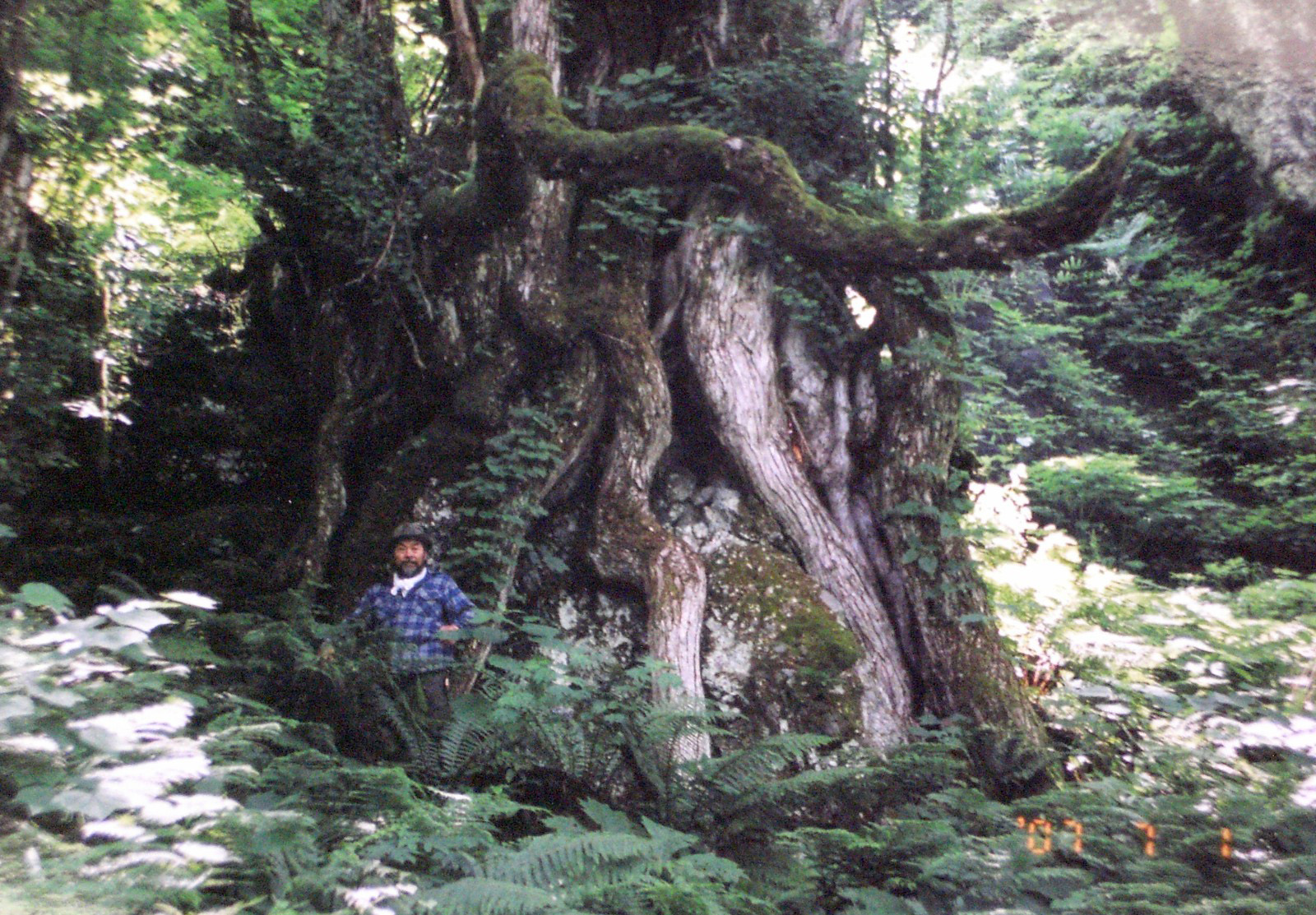 A 2,000 year old tree that Kishi Sensei often hiked to near his mountain dojo.
A 2,000 year old tree that Kishi Sensei often hiked to near his mountain dojo.
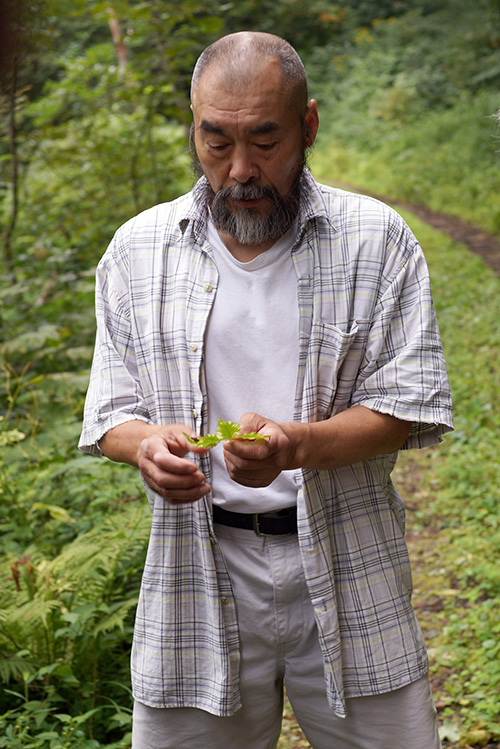 Kishi Sensei was knowledgeable about edible plants.
Through the autumn of 2017, he spent as much time as he could at his mountain dojo until the snow made it impossible to drive there.
Kishi Sensei in March 2018 explaining that the spirit and the physical body work together.
“There are many styles of karate, but Kishi Karate does not have a defined “style.” My dojo must seem very boring because I teach only the basics of karate and I let my students develop on their own. But karate is different for each person. It is not something you can be taught by someone else; it is something you must develop from within.”
Kishi Sensei was knowledgeable about edible plants.
Through the autumn of 2017, he spent as much time as he could at his mountain dojo until the snow made it impossible to drive there.
Kishi Sensei in March 2018 explaining that the spirit and the physical body work together.
“There are many styles of karate, but Kishi Karate does not have a defined “style.” My dojo must seem very boring because I teach only the basics of karate and I let my students develop on their own. But karate is different for each person. It is not something you can be taught by someone else; it is something you must develop from within.”
Kishi Sensei spent his final month at his dojo in Shinjo. Illness, pain, and weakness from his inability to eat did not change his profound sense of the meaning and form that karate gave his life. Sensei passed away on April 23rd, 2018. He died with the focused dignity of a master.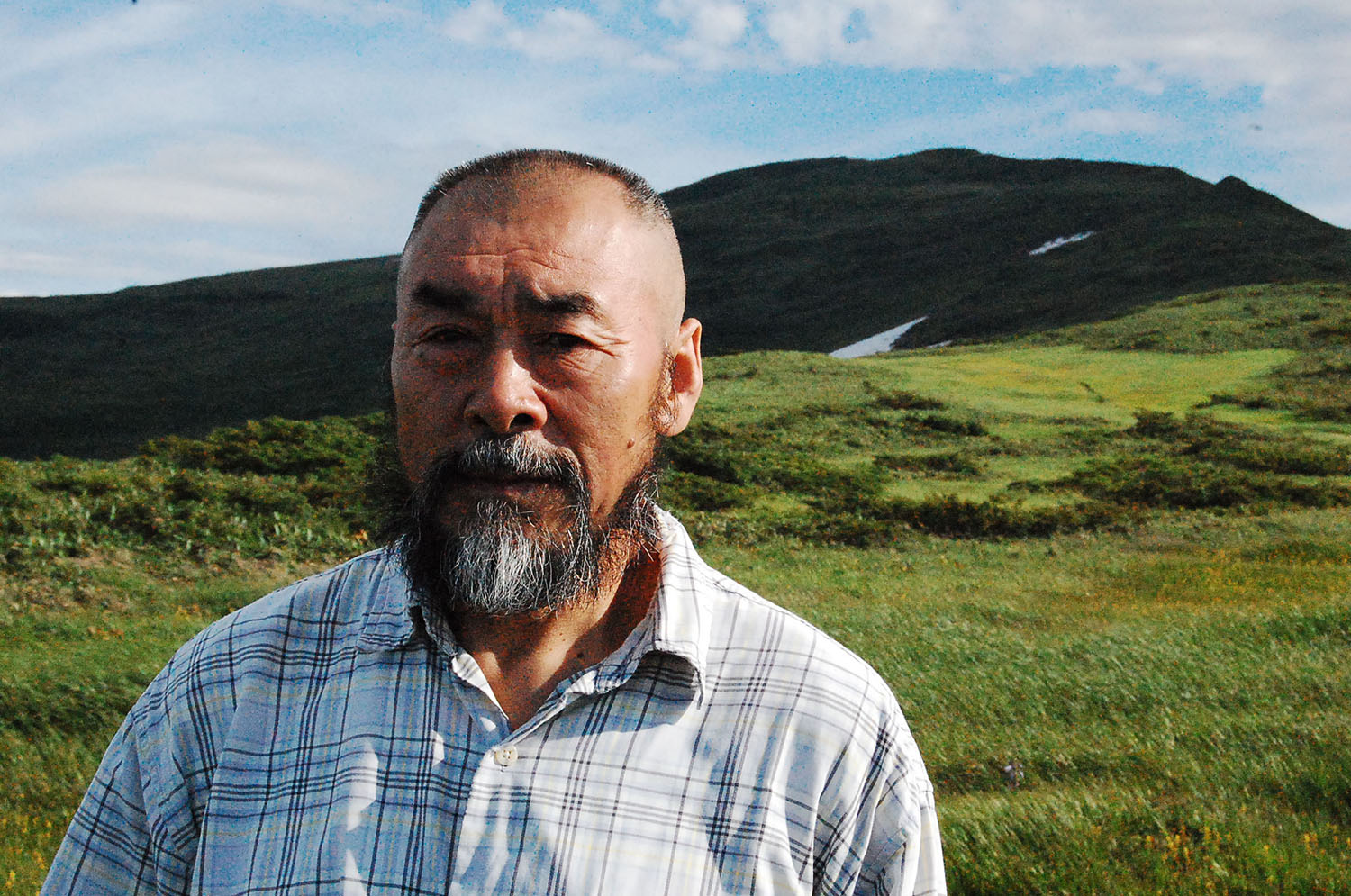 Kishi Sensei at Mount Gassan.
“I am entering old age now, and so are my karate colleagues. It would make me very happy if we were able to pass on to the next generation something of what we have learned through karate.”
Kishi Sensei at Mount Gassan.
“I am entering old age now, and so are my karate colleagues. It would make me very happy if we were able to pass on to the next generation something of what we have learned through karate.”
Kishi Sensei grew up in the harsh post-war economy, helping his father with subsistence farming, charcoal making, and construction projects. His upbringing in an environment marked by distinct seasons made him acutely aware of the blessings and dangers of nature.
 Young Kishi Nobuyuki (right) with his brother Yasunori (left) in Tobita.
At the age of 19, Kishi Nobuyuki made the very deliberate decision to defy his father’s will, and he secretly left home for Tokyo to train among the best in karate. He became a dedicated uchideshi (live-in student) of Masutatsu Oyama, the founder of Kyokushin Karate. He was sent to Taiwan, New York, Italy and Romania to help spread the style of full-contact Kyokushin Karate.
Young Kishi Nobuyuki (right) with his brother Yasunori (left) in Tobita.
At the age of 19, Kishi Nobuyuki made the very deliberate decision to defy his father’s will, and he secretly left home for Tokyo to train among the best in karate. He became a dedicated uchideshi (live-in student) of Masutatsu Oyama, the founder of Kyokushin Karate. He was sent to Taiwan, New York, Italy and Romania to help spread the style of full-contact Kyokushin Karate.
 Kishi Nobuyuki (right) shortly after receiving his shodan from Masutatsu Oyama (center).
Although it is now recognized as a competitive sport, Kishi Sensei understood karate differently. As much as karate is about training the body, it is also about training one's mind and heart. He sought to help each student use their karate training to align with their inner motivations and their unique body and psychology in order to find balance and truth in themselves. He believed that each of us can be more than we are today, and can do better than we did yesterday; the opponent is ourselves.
Kishi Nobuyuki (right) shortly after receiving his shodan from Masutatsu Oyama (center).
Although it is now recognized as a competitive sport, Kishi Sensei understood karate differently. As much as karate is about training the body, it is also about training one's mind and heart. He sought to help each student use their karate training to align with their inner motivations and their unique body and psychology in order to find balance and truth in themselves. He believed that each of us can be more than we are today, and can do better than we did yesterday; the opponent is ourselves.
 Kishi Sensei's simple beauty and balance in technique maximized power while economizing movement.
Through sweating and pushing one's physical limits, we learn to understand our capabilities and mental resources, thereby gaining a confidence that transfers to other areas of life. By giving oneself the opportunity to engage in kumite, we develop respect for ourselves and others, and become more peaceful and courageous. In each training session, there are expected routines, unexpected challenges, kata, kumite with various sparring partners, and seated meditation with eyes closed as breathing settles into a calm rhythm. Karate practice is an active meditation that encourages a healthy mind and a healthy body. It is a way of life.
This was a philosophy that did not fit with membership in a large organization, and Kishi Sensei left Kyokushin to open his own independent dojo in New York City under the name of Kishi Karate.
Kishi Sensei's simple beauty and balance in technique maximized power while economizing movement.
Through sweating and pushing one's physical limits, we learn to understand our capabilities and mental resources, thereby gaining a confidence that transfers to other areas of life. By giving oneself the opportunity to engage in kumite, we develop respect for ourselves and others, and become more peaceful and courageous. In each training session, there are expected routines, unexpected challenges, kata, kumite with various sparring partners, and seated meditation with eyes closed as breathing settles into a calm rhythm. Karate practice is an active meditation that encourages a healthy mind and a healthy body. It is a way of life.
This was a philosophy that did not fit with membership in a large organization, and Kishi Sensei left Kyokushin to open his own independent dojo in New York City under the name of Kishi Karate.In his karate practice, Kishi Sensei strove for a simple beauty and balance that maximized power while economizing movement. The phrase kobushi-hitosuji – meaning “fist” and “to devote your life to one thing” – represented the reality of Kishi Sensei's life.
 Standing on the roof of his Shinjo dojo, a former Meiji period samurai house.
Standing on the roof of his Shinjo dojo, a former Meiji period samurai house.
 In his Shinjo dojo after training with his local Japanese students and visiting New York students.
In 1994, he left his dojo in New York and returned to Japan to care for his mother. After her death, he remained in Shinjo and continued to teach and train at his own Kishi Karate dojo there. When Kishi Sensei first opened his Shinjo dojo, there was no sign over the entrance. “What about a sign?” he was asked. Kishi Sensei answered, “If people really want to find me, I’m sure they will.” This proved true, and people from all over did come to visit and train with him.
"I believe that Karate already exists inside everyone’s body. You must develop and polish what’s inside you to make your own Karate. Even if there is no dojo nearby, training on your own can take you very far if you have a passion for it."
In his Shinjo dojo after training with his local Japanese students and visiting New York students.
In 1994, he left his dojo in New York and returned to Japan to care for his mother. After her death, he remained in Shinjo and continued to teach and train at his own Kishi Karate dojo there. When Kishi Sensei first opened his Shinjo dojo, there was no sign over the entrance. “What about a sign?” he was asked. Kishi Sensei answered, “If people really want to find me, I’m sure they will.” This proved true, and people from all over did come to visit and train with him.
"I believe that Karate already exists inside everyone’s body. You must develop and polish what’s inside you to make your own Karate. Even if there is no dojo nearby, training on your own can take you very far if you have a passion for it."
Kishi Sensei’s love of walking in the mountains, clean air, and peaceful harmony with nature ran very deep. He dreamed of establishing a mountain dojo where people could put aside daily preoccupations and concentrate on finding their natural energy and strength. He believed that being alone in nature provided the best opportunity to develop the courage to confront our lives honestly and directly.
 The first two cabins at Kishi Sensei's mountain dojo.
“When a person has a poor character, his karate is also poor — that is what I believe. It does not matter how athletic you are or how many trophies you’ve won. Simply said, it is your sincerity of heart that determines your karate. Also, if you are not in earnest, you cannot be a karateka. Technical skill and power are earned by diligent training. The word Bujutsu — meaning martial arts — consists of two characters, 'bu' and 'jutsu' meaning fighting skill. The word 'Budo' includes the sense of seeking the path or 'way' of a warrior. You must truly seek the way of karate in order to become a real karateka.”
The first two cabins at Kishi Sensei's mountain dojo.
“When a person has a poor character, his karate is also poor — that is what I believe. It does not matter how athletic you are or how many trophies you’ve won. Simply said, it is your sincerity of heart that determines your karate. Also, if you are not in earnest, you cannot be a karateka. Technical skill and power are earned by diligent training. The word Bujutsu — meaning martial arts — consists of two characters, 'bu' and 'jutsu' meaning fighting skill. The word 'Budo' includes the sense of seeking the path or 'way' of a warrior. You must truly seek the way of karate in order to become a real karateka.”
 A 2,000 year old tree that Kishi Sensei often hiked to near his mountain dojo.
A 2,000 year old tree that Kishi Sensei often hiked to near his mountain dojo.
 Kishi Sensei was knowledgeable about edible plants.
Through the autumn of 2017, he spent as much time as he could at his mountain dojo until the snow made it impossible to drive there.
Kishi Sensei in March 2018 explaining that the spirit and the physical body work together.
“There are many styles of karate, but Kishi Karate does not have a defined “style.” My dojo must seem very boring because I teach only the basics of karate and I let my students develop on their own. But karate is different for each person. It is not something you can be taught by someone else; it is something you must develop from within.”
Kishi Sensei was knowledgeable about edible plants.
Through the autumn of 2017, he spent as much time as he could at his mountain dojo until the snow made it impossible to drive there.
Kishi Sensei in March 2018 explaining that the spirit and the physical body work together.
“There are many styles of karate, but Kishi Karate does not have a defined “style.” My dojo must seem very boring because I teach only the basics of karate and I let my students develop on their own. But karate is different for each person. It is not something you can be taught by someone else; it is something you must develop from within.”
Kishi Sensei spent his final month at his dojo in Shinjo. Illness, pain, and weakness from his inability to eat did not change his profound sense of the meaning and form that karate gave his life. Sensei passed away on April 23rd, 2018. He died with the focused dignity of a master.
 Kishi Sensei at Mount Gassan.
“I am entering old age now, and so are my karate colleagues. It would make me very happy if we were able to pass on to the next generation something of what we have learned through karate.”
Kishi Sensei at Mount Gassan.
“I am entering old age now, and so are my karate colleagues. It would make me very happy if we were able to pass on to the next generation something of what we have learned through karate.”